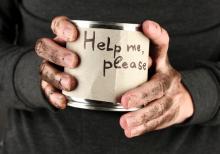need

I spent last Saturday walking around Anthem, Ariz. It’s a strip of outlet malls and a Wal-Mart 30 miles north of Phoenix in the desert, and it’s as bad as it sounds. It’s hot and boring, and I was walking around all day because my new truck was broken and the mechanic wasn’t going to get to it until Monday. And it was going to cost $1,600 … which I don’t have. So I walked around and felt miserable and it sucked in a Big Way.
Saturday night my friend drove 30 miles to come and pick me up. He let me eat dinner at his house, and his mom made steak and it was delicious. I got a ride back home with some other friends that night, and for the rest of the weekend, I was driven around by my girlfriend. In addition to this, my family lent me money. Some family gave me money. I was stranded in Anthem, Ariz., where I didn’t know anybody and didn’t have any money in my bank account and I was worried and bored and scared, and maybe I cried a little bit. But I talked to my family and my friends on the phone and they helped me. They cared for me. And they are still caring for me.
I don’t have a hard life and I’m grateful for that, but in this time of mini-crisis, the people who love me have gone out of their way to care of me. They’ve asked me exactly what I needed and given it to me without thinking twice. In some cases, they’ve seen that I’m too proud (or stupid) to ask for what I need and given it to me anyway. And it has punched me in the stomach. It is humbling and it is touching, and it makes me want to be a better person.
You see, Christian brothers and sisters, that’s what caring looks like.

As has happened many times after I have given a talk about the Body of Christ’s responsibility to care for their brothers and sisters experiencing impoverished and dehumanizing conditions, I was asked to answerthose questions — the ones in my experience that are always the first to be asked the moment I stop speaking.
“How will I know I have given enough? How does the church balance financial responsibility with service to the poor? Where do we draw the line?”
These questions always come, sometimes spoken in a curious tone by a person whose heart is being convicted, sometimes in an angry accusing tone insinuating I must hate prosperity, sometimes privately as a whisper in my ear or in a personal email filled with insinuations about my sanity. What a preposterous proposal, that the Body of Christ in any particular location should be the first resource to its own community for spiritual, physical, and emotional well being! Don’t I know that such a mission is naïve and impossible to achieve? Most recently it was phrased like this: “I love this idea, but it is difficult to see benevolence funds go towards someone's electric bill when they smell like they smoked five packs of cigs before meeting with us; what do we do?”